牛津深圳版五年级下册英语期中复习课件(共52张PPT)
文档属性
| 名称 | 牛津深圳版五年级下册英语期中复习课件(共52张PPT) |
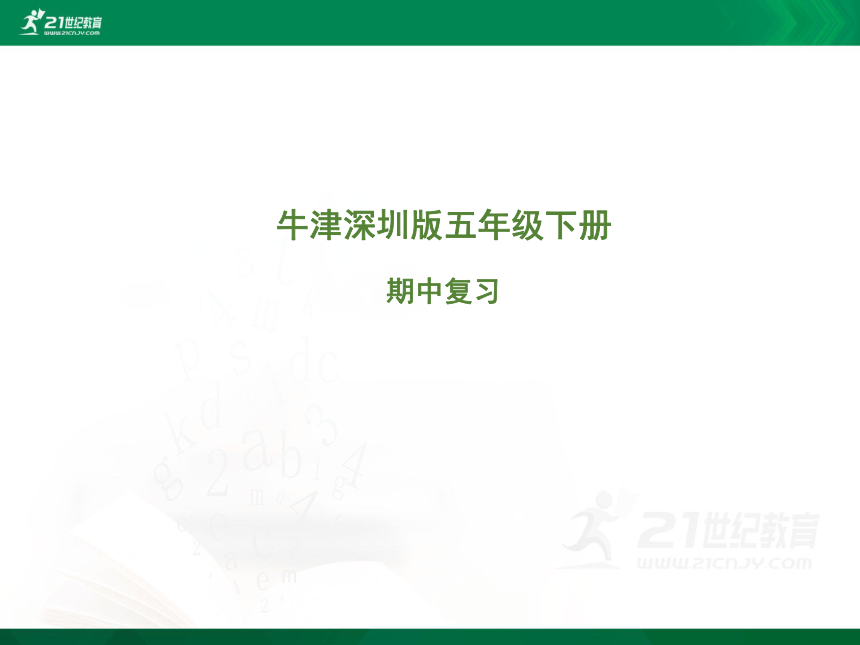
|
|
| 格式 | pptx | ||
| 文件大小 | 5.2MB | ||
| 资源类型 | 试卷 | ||
| 版本资源 | 牛津深圳版 | ||
| 科目 | 英语 | ||
| 更新时间 | 2022-01-19 00:00:00 | ||
图片预览

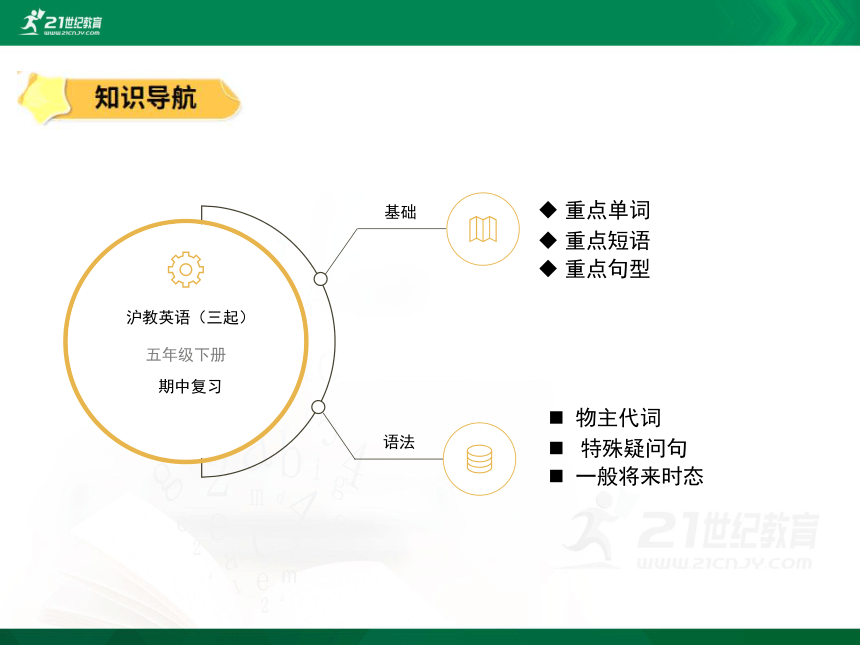
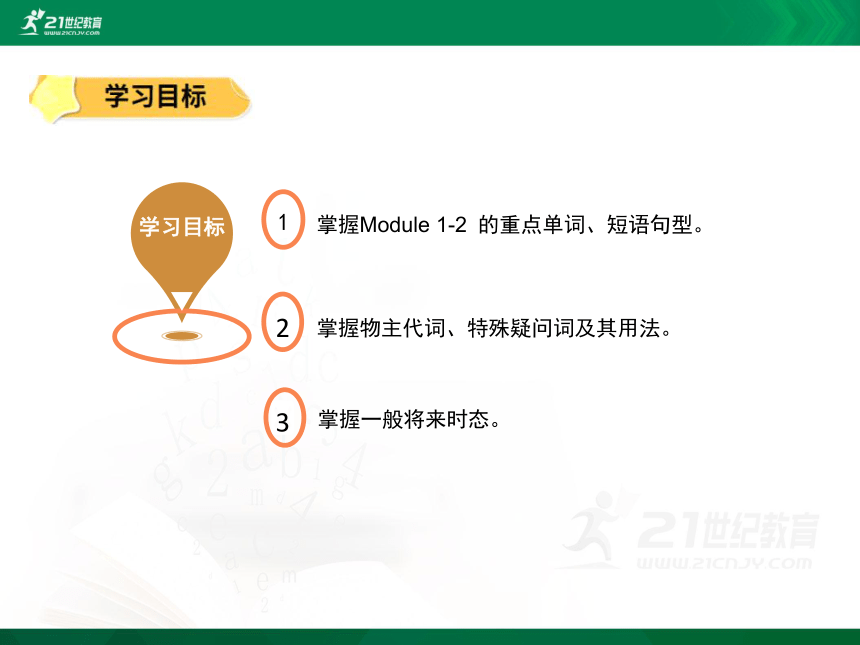
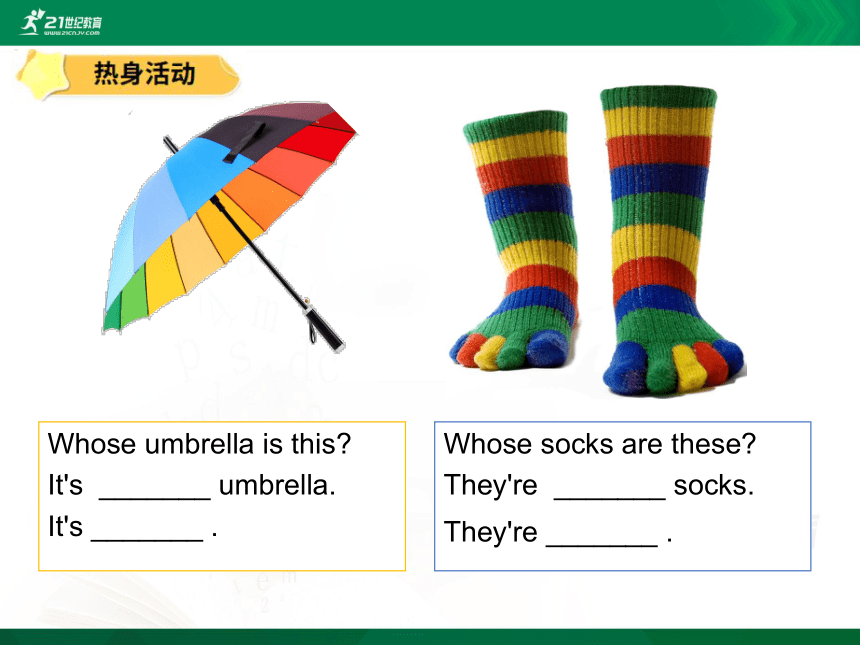
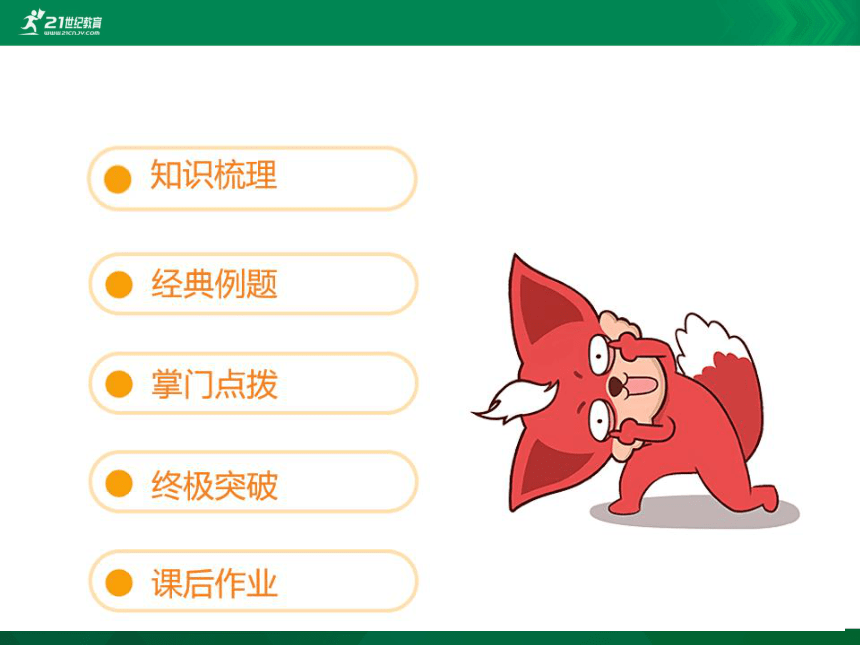
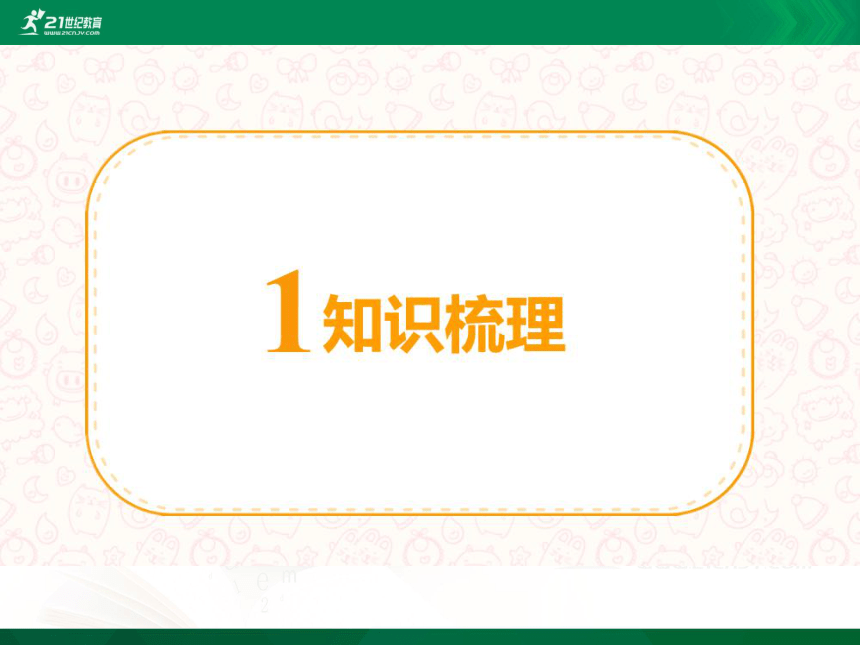
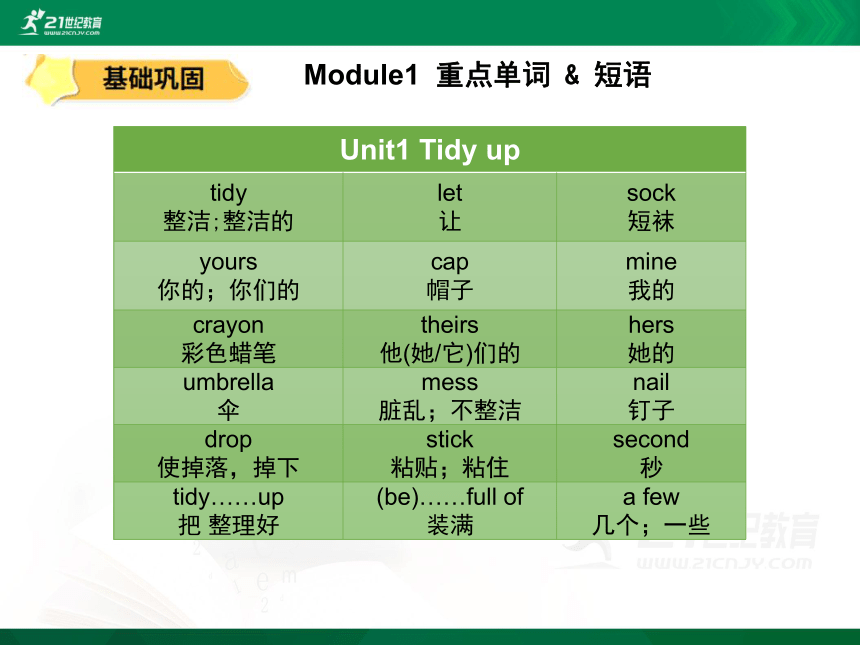
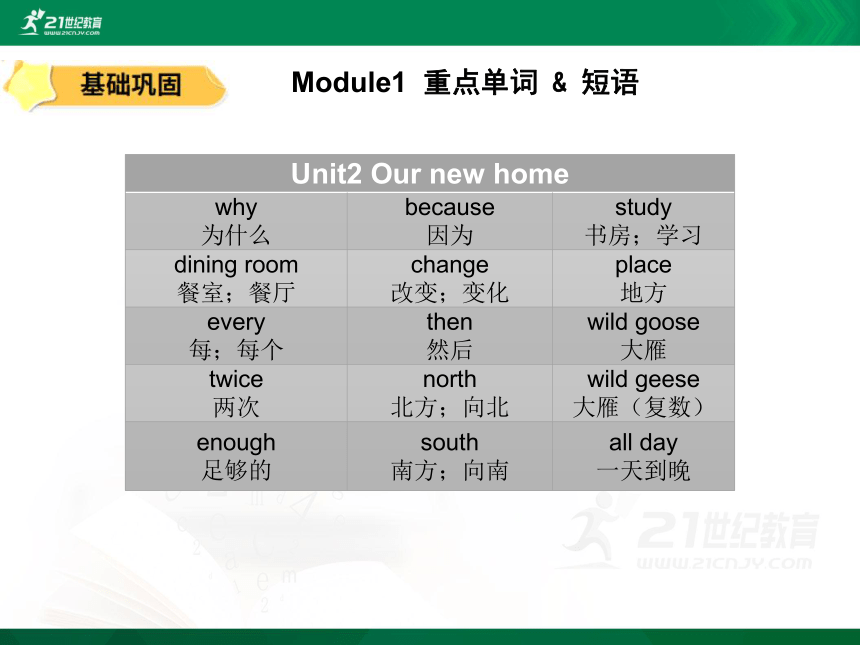
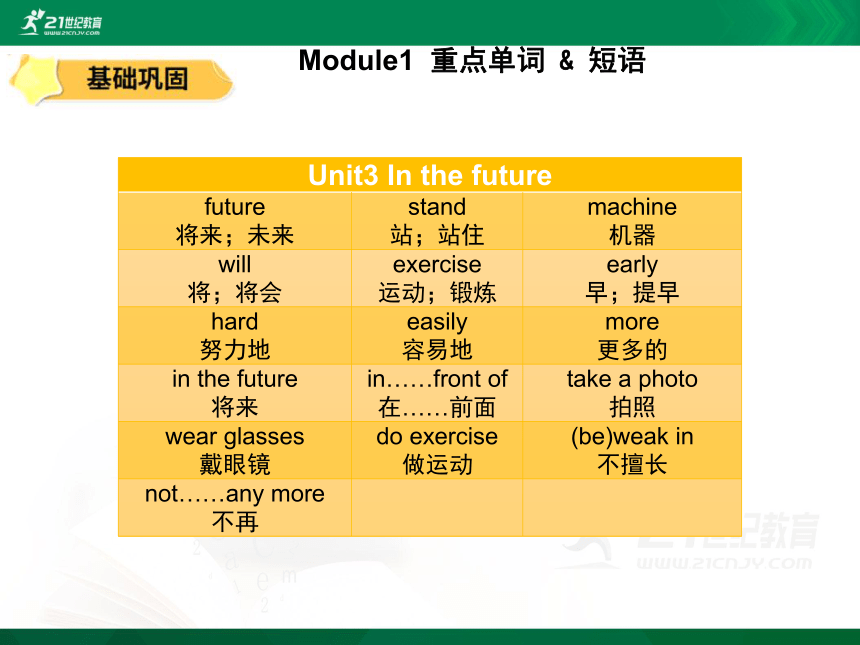
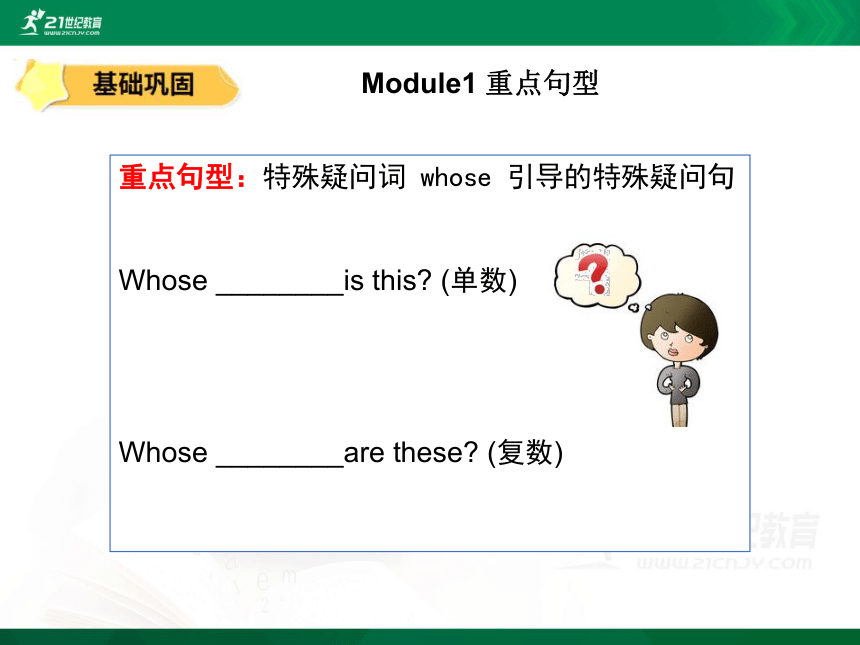
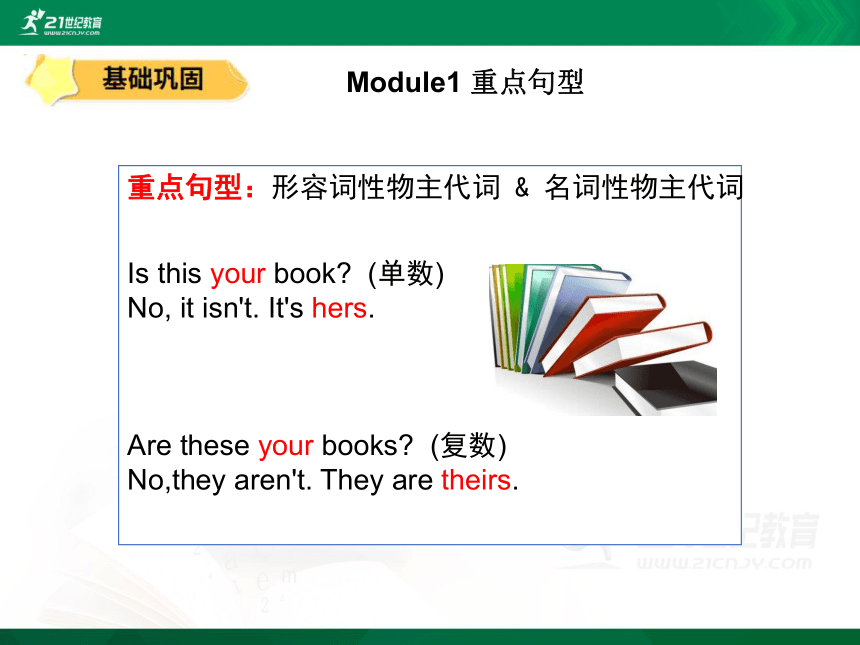
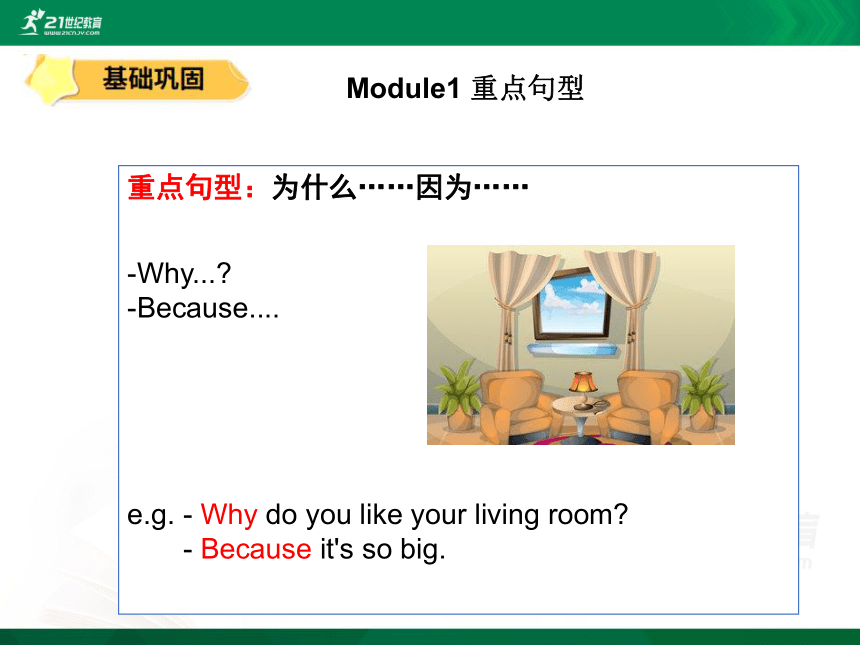
文档简介
(共52张PPT)
牛津深圳版五年级下册
期中复习
基础
语法
沪教英语(三起)
五年级下册
期中复习
重点单词
重点短语
重点句型
物主代词
特殊疑问句
一般将来时态
学习目标
1
掌握Module 1-2 的重点单词、短语句型。
2
3
掌握物主代词、特殊疑问词及其用法。
掌握一般将来时态。
Whose umbrella is this
It's _______ umbrella.
It's _______ .
Whose socks are these
They're _______ socks.
They're _______ .
Module1 重点单词 & 短语
Unit1 Tidy up
tidy 整洁;整洁的 let 让 sock
短袜
yours 你的;你们的 cap 帽子 mine
我的
crayon 彩色蜡笔 theirs 他(她/它)们的 hers
她的
umbrella 伞 mess 脏乱;不整洁 nail
钉子
drop 使掉落,掉下 stick 粘贴;粘住 second
秒
tidy……up 把 整理好 (be)……full of 装满 a few
几个;一些
Module1 重点单词 & 短语
Unit2 Our new home
why 为什么 because 因为 study
书房;学习
dining room 餐室;餐厅 change 改变;变化 place
地方
every 每;每个 then 然后 wild goose
大雁
twice 两次 north 北方;向北 wild geese
大雁(复数)
enough 足够的 south 南方;向南 all day
一天到晚
Unit3 In the future
future 将来;未来 stand 站;站住 machine
机器
will 将;将会 exercise 运动;锻炼 early
早;提早
hard 努力地 easily 容易地 more
更多的
in the future 将来 in……front of在……前面 take a photo
拍照
wear glasses 戴眼镜 do exercise 做运动 (be)weak in
不擅长
not……any more 不再
Module1 重点单词 & 短语
Module1 重点句型
重点句型:特殊疑问词 whose 引导的特殊疑问句
Whose ________is this (单数)
Whose ________are these (复数)
Module1 重点句型
重点句型:形容词性物主代词 & 名词性物主代词
Is this your book (单数)
No, it isn't. It's hers.
Are these your books (复数)
No,they aren't. They are theirs.
Module1 重点句型
重点句型:为什么……因为……
-Why...
-Because....
e.g. - Why do you like your living room
- Because it's so big.
Module2 重点单词 & 短语
Unit 4 Reading is fun
storybook 故事书 buy 买 story
故事
dictionary 字典;词典 magazine 杂志 newspaper
报纸
week 周;星期 student 学生 poster
海报
best 最好的 writer 作家 over there
在那边
do a survey 做调查 act……out 表演
Module2 重点单词 & 短语
Unit 5 At the weekend
weekend 周末 stay 待;暂住;逗留 film
电影
boat 小船;舟 plan 安排;计划 tomorrow
明天
build 建筑;建造 next 紧接着;紧接着的 cry
哭;喊叫
swing 秋千 see a film 看电影 row a boat
划船
Module2 重点短语 & 短语
Unit 6 Holidays
holiday假日;假期 clear清澈的 seafood海鲜
hotel旅馆 island岛 butterfly蝴蝶
how long多久 go swimming 去游泳 in the south of
在……的南部
all year round 一年到头 by the sea 在海边 the Sea World
海洋世界
sea plant海洋植物 enough足够的
Module 2 重点句型
重点句型:一般将来时态
will 句型
肯定句: 主语+will + 动词原形.
否定句: 主语+will+not+动词原形.
一般疑问句:will+主语+动词原形
特殊疑问句:WH+will+主语+动词原形
be going to 句型
肯定句:主语+be going to +动词原形.
否定句:主语+be not going to+动词原形.
一般疑问句:be +主语+going to +动词原形
特殊疑问句:WH+be +主语+going to +动词原形
Module 2 重点句型
重点句型:动名词 + is fun. 表示做某事很有意思
e.g.
Swimming is fun.
Playing ball games is fun.
Singing is fun.
Riding a bike is fun.
Reading is fun.
Module 2 重点句型
重点句型:
They get there by+交通工具 .
e.g.
-How do they get there
-They get there by car/taxi/plan/train/...
一. 单选题
1. You live in Beijing. ( )
A. will B. are C. well
Beijing
1. You will live Beijing. ( )
A. will B. are C. well
答案:A
解析:You will live in Beijing.你将会住在北京。
点评:本题考查的是对will的掌握。
一. 单选题
2. Will she beautiful eyes? ( )
A. has B. have C. having
一. 单选题
2. Will she beautiful eyes? ( )
A. has B. have C. having
答案:B
解析:Will she have beautiful eyes?她会有漂亮的眼睛吗?
点评:本题考查的是对will后接动词原形的掌握。
一. 单选题
3. —Will she wear glasses?
— .( )
A. Yes,will. B. No, she won’t. C. Yes, he will.
一. 单选题
答案:B
解析:Will she wear glasses?她将会戴眼镜吗?No, she won’t. 不,她不会。
点评:本题考查的是Will he/she…?的回答。
3. —Will she wear glasses?
— .( )
A. Yes,will. B. No, she won’t. C. Yes, he will.
一. 单选题
4. —What Peter do?
—He will be a doctor. ( )
A. is B. will C. does
一. 单选题
4. —What Peter do?
—He will be a doctor. ( )
A. is B. will C. does
答案:B
解析:What will Peter do?彼得将要做什么?He will be a doctor.他将做一名医生。
点评:本题考查的是对will句型的掌握。
一. 单选题
二. 填空题
1. This is_______in the future.(我)
1. This is______in the future.(我)
答案:me
解析:分析:This is me in the future.这是将来的我。
点评:本题考查的是对人称代词的掌握。
二. 填空题
2. I’ll ________ exercise every day. (做)
二. 填空题
2. I’ll ________ exercise every day.
答案:do
解析:I’ll do exercise every day.我将每天做运动。
点评:本题考查的是对do exercise做运动以及will后面用动词原形的掌握。
二. 填空题
一般将来时表示将来某一时刻的动作或状态,或将来某一段时间内经常的动作或状态。
一般将来时态
Today
Yesterday
Tomorrow
past --------------- present ------------- future---->
一般将来时
一般将来时常与一些表示将来的时间状语连用,如:
tomorrow(明天),next week(下周),from now on(从现在开始),in the future(将来);someday(未来的某一天)等。
Eg. I will go to school tomorrow.
一般将来时的形式
一般将来时态
一般将来时的形式
肯定句: 主语+will + 动词原形
否定句: 主语+ won't + 动词原形
一般疑问句:Will +主语+动词原形...
肯定回答: Yes, ... will.
否定回答:No, ... won't.
特殊疑问句: 疑问词 + +主语+动词原形...
回答: 主语+will + 动词原形
一般将来时态
一般将来时的形式(例句)
肯定句:I will do my homework.
否定句:I will not do my homework.
一般疑问句:Will you do you homework
肯定回答: Yes, I will.
否定回答:No, I won't.
特殊疑问句: What will you do?
回答: I will do my homework.
一般将来时态
连词成句
1. every story I’m to a day going read
答案:
1. I’m going to read a story every day.
解析:I’m going to read a story every day.
我每天都要读一个故事。be going to go sth. 句型,表示主语打算做某事。
点评:做这类题需要注意首字母大写,最后加标点符号,不要多词不要少词。
连词成句
句型转换
I’m going to read a story . (对划线部分提问)
____________________________________________________
句型转换
答案:What are you going to do
解析:从划线的read a story可以看出,应问用特殊疑问词 “what”代替“read a story”提问What are you going to do
点评:本题考查的是就划线部分提问。是英语学习中常见的句型掌握题。
判断对(T)错(F)
A letter
Here is a letter from Jim to his friend in the USA
Dear lily,I am in China now. I go to school five days a week. The school and the food are good here. I have some Chinese friends. They are all very friendly to me. On Saturdays and Sundays we stay at home .In the afternoon we play games. My Chinese friends like English very much. They ask me to teach them English and they teach me Chinese. I like staying here. Please write soon!
(1)This letter is from Jim to Lily . ( )
(2)Jim likes Chinese food but he doesn’t like the school. ( )
(3)Jim is not at school on Saturdays and Sundays. ( )
(4)Jim thinks his Chinese friends are good to him. ( )
(5)Jim and his friends doesn’t play games. ( )
(1)This letter is from Jim to Lily . 答案:正确(T)
(2)Jim likes Chinese food but he doesn’t like the school. 答案:错误(F)
(3)Jim is not at school on Saturdays and Sundays. 答案:正确(T)
(4)Jim thinks his Chinese friends are good to him. 答案:正确(T)
(5)Jim and his friends doesn’t play games. 答案:错误(F)
解析:短文大意:一封信
这是一封吉姆写给他美国朋友的信。心爱的莉莉:我现在在中国。我一周去学校五天。这里的学校和食物都很好。我有一些中国朋友。他们都对我很好。周六周日我们待在家里。下午我们一起玩游戏。我的中国朋友非常喜欢英语。他们让我教他们英语,他们教我汉语。我喜欢在这学习。速回信。
(1)这封信是吉姆写给莉莉的,正确。
(2)吉姆喜欢中国食物不喜欢中国学校,错误。
(3)吉姆周六周日不上学,正确。
(4)吉姆认为他的中国朋友对他很好,正确。
(5)吉姆不和他的朋友玩游戏,错误。
点评:本题考查的是学生综合运用英语的能力,需要学生有一定的语言积累。
判断对(T)错(F)
翻译句子
I’m going to look at the picture books over there.
I’m going to look at the picture books over there.
答案:我要去看那边的图画书。
解析:be going to do sth. 打算;将要去做某事。look at “看” 固定搭配。over there “那边”。所以整句可以翻译做“ 我要去看那边的图画书。”
点评:本题考查的是对课文句意的掌握情况。
翻译句子
句子改错
He is going to buys a dictionary.
He is going to buys a dictionary.
答案:He is going to buy a dictionary.
解析:be going to 后面要跟动词原形,buy(买)的原形是buy, 所以句子应该改为He is going to buy a dictionary.他要去买一个字典。
点评:本题考查的是对be going to后面加动词原形的掌握情况。
句子改错
Amy is my best friend. She’s a nice girl. She’s ten. She’s tall and quiet. She has long hair and a small mouth. She has big eyes and a small nose. She likes music, computer games and painting. She likes books, too. She has fifty story-books. She is a good student. I like her very much.
(1). Amy is my sister. ( )
(2). Amy is not quiet. ( )
(3). Amy has 15 story-books. ( )
(4). Amy likes painting and books. ( )
(5). Amy has long hair and a small nose. ( )
判断对(T)错(F)
(1). Amy is my sister. 答案:错误(F)
(2). Amy is not quiet. 答案:错误(F)
(3). Amy has 15 story-books. 答案:错误(F)
(4). Amy likes painting and books. 答案:正确(T)
(5). Amy has long hair and a small nose. 答案:正确(T)
解析:短文大意:艾米是我最好的朋友。她是一个好看的女孩。她十岁了。她很高也很安静。她有长长的头发和一个小嘴。她有大眼睛和一个小鼻子。她喜欢音乐、计算机游戏和画画。她也喜欢书。她有五十本故事书。她是一名好学生。我非常喜欢她。
(1)艾米是我的妹妹,错误。
(2)她不安静,错误。
(3)她有十五本故事书,错误。
(4)她喜欢画画和书,正确。
(5)她有长长的头发和小鼻子,正确。
点评:本题考查的是学生综合运用英语的能力,需要学生有一定的语言积累。
判断对(T)错(F)
谢谢
21世纪教育网(www.21cnjy.com) 中小学教育资源网站
有大把高质量资料?一线教师?一线教研员?
欢迎加入21世纪教育网教师合作团队!!月薪过万不是梦!!
详情请看:
https://www.21cnjy.com/help/help_extract.php
牛津深圳版五年级下册
期中复习
基础
语法
沪教英语(三起)
五年级下册
期中复习
重点单词
重点短语
重点句型
物主代词
特殊疑问句
一般将来时态
学习目标
1
掌握Module 1-2 的重点单词、短语句型。
2
3
掌握物主代词、特殊疑问词及其用法。
掌握一般将来时态。
Whose umbrella is this
It's _______ umbrella.
It's _______ .
Whose socks are these
They're _______ socks.
They're _______ .
Module1 重点单词 & 短语
Unit1 Tidy up
tidy 整洁;整洁的 let 让 sock
短袜
yours 你的;你们的 cap 帽子 mine
我的
crayon 彩色蜡笔 theirs 他(她/它)们的 hers
她的
umbrella 伞 mess 脏乱;不整洁 nail
钉子
drop 使掉落,掉下 stick 粘贴;粘住 second
秒
tidy……up 把 整理好 (be)……full of 装满 a few
几个;一些
Module1 重点单词 & 短语
Unit2 Our new home
why 为什么 because 因为 study
书房;学习
dining room 餐室;餐厅 change 改变;变化 place
地方
every 每;每个 then 然后 wild goose
大雁
twice 两次 north 北方;向北 wild geese
大雁(复数)
enough 足够的 south 南方;向南 all day
一天到晚
Unit3 In the future
future 将来;未来 stand 站;站住 machine
机器
will 将;将会 exercise 运动;锻炼 early
早;提早
hard 努力地 easily 容易地 more
更多的
in the future 将来 in……front of在……前面 take a photo
拍照
wear glasses 戴眼镜 do exercise 做运动 (be)weak in
不擅长
not……any more 不再
Module1 重点单词 & 短语
Module1 重点句型
重点句型:特殊疑问词 whose 引导的特殊疑问句
Whose ________is this (单数)
Whose ________are these (复数)
Module1 重点句型
重点句型:形容词性物主代词 & 名词性物主代词
Is this your book (单数)
No, it isn't. It's hers.
Are these your books (复数)
No,they aren't. They are theirs.
Module1 重点句型
重点句型:为什么……因为……
-Why...
-Because....
e.g. - Why do you like your living room
- Because it's so big.
Module2 重点单词 & 短语
Unit 4 Reading is fun
storybook 故事书 buy 买 story
故事
dictionary 字典;词典 magazine 杂志 newspaper
报纸
week 周;星期 student 学生 poster
海报
best 最好的 writer 作家 over there
在那边
do a survey 做调查 act……out 表演
Module2 重点单词 & 短语
Unit 5 At the weekend
weekend 周末 stay 待;暂住;逗留 film
电影
boat 小船;舟 plan 安排;计划 tomorrow
明天
build 建筑;建造 next 紧接着;紧接着的 cry
哭;喊叫
swing 秋千 see a film 看电影 row a boat
划船
Module2 重点短语 & 短语
Unit 6 Holidays
holiday假日;假期 clear清澈的 seafood海鲜
hotel旅馆 island岛 butterfly蝴蝶
how long多久 go swimming 去游泳 in the south of
在……的南部
all year round 一年到头 by the sea 在海边 the Sea World
海洋世界
sea plant海洋植物 enough足够的
Module 2 重点句型
重点句型:一般将来时态
will 句型
肯定句: 主语+will + 动词原形.
否定句: 主语+will+not+动词原形.
一般疑问句:will+主语+动词原形
特殊疑问句:WH+will+主语+动词原形
be going to 句型
肯定句:主语+be going to +动词原形.
否定句:主语+be not going to+动词原形.
一般疑问句:be +主语+going to +动词原形
特殊疑问句:WH+be +主语+going to +动词原形
Module 2 重点句型
重点句型:动名词 + is fun. 表示做某事很有意思
e.g.
Swimming is fun.
Playing ball games is fun.
Singing is fun.
Riding a bike is fun.
Reading is fun.
Module 2 重点句型
重点句型:
They get there by+交通工具 .
e.g.
-How do they get there
-They get there by car/taxi/plan/train/...
一. 单选题
1. You live in Beijing. ( )
A. will B. are C. well
Beijing
1. You will live Beijing. ( )
A. will B. are C. well
答案:A
解析:You will live in Beijing.你将会住在北京。
点评:本题考查的是对will的掌握。
一. 单选题
2. Will she beautiful eyes? ( )
A. has B. have C. having
一. 单选题
2. Will she beautiful eyes? ( )
A. has B. have C. having
答案:B
解析:Will she have beautiful eyes?她会有漂亮的眼睛吗?
点评:本题考查的是对will后接动词原形的掌握。
一. 单选题
3. —Will she wear glasses?
— .( )
A. Yes,will. B. No, she won’t. C. Yes, he will.
一. 单选题
答案:B
解析:Will she wear glasses?她将会戴眼镜吗?No, she won’t. 不,她不会。
点评:本题考查的是Will he/she…?的回答。
3. —Will she wear glasses?
— .( )
A. Yes,will. B. No, she won’t. C. Yes, he will.
一. 单选题
4. —What Peter do?
—He will be a doctor. ( )
A. is B. will C. does
一. 单选题
4. —What Peter do?
—He will be a doctor. ( )
A. is B. will C. does
答案:B
解析:What will Peter do?彼得将要做什么?He will be a doctor.他将做一名医生。
点评:本题考查的是对will句型的掌握。
一. 单选题
二. 填空题
1. This is_______in the future.(我)
1. This is______in the future.(我)
答案:me
解析:分析:This is me in the future.这是将来的我。
点评:本题考查的是对人称代词的掌握。
二. 填空题
2. I’ll ________ exercise every day. (做)
二. 填空题
2. I’ll ________ exercise every day.
答案:do
解析:I’ll do exercise every day.我将每天做运动。
点评:本题考查的是对do exercise做运动以及will后面用动词原形的掌握。
二. 填空题
一般将来时表示将来某一时刻的动作或状态,或将来某一段时间内经常的动作或状态。
一般将来时态
Today
Yesterday
Tomorrow
past --------------- present ------------- future---->
一般将来时
一般将来时常与一些表示将来的时间状语连用,如:
tomorrow(明天),next week(下周),from now on(从现在开始),in the future(将来);someday(未来的某一天)等。
Eg. I will go to school tomorrow.
一般将来时的形式
一般将来时态
一般将来时的形式
肯定句: 主语+will + 动词原形
否定句: 主语+ won't + 动词原形
一般疑问句:Will +主语+动词原形...
肯定回答: Yes, ... will.
否定回答:No, ... won't.
特殊疑问句: 疑问词 + +主语+动词原形...
回答: 主语+will + 动词原形
一般将来时态
一般将来时的形式(例句)
肯定句:I will do my homework.
否定句:I will not do my homework.
一般疑问句:Will you do you homework
肯定回答: Yes, I will.
否定回答:No, I won't.
特殊疑问句: What will you do?
回答: I will do my homework.
一般将来时态
连词成句
1. every story I’m to a day going read
答案:
1. I’m going to read a story every day.
解析:I’m going to read a story every day.
我每天都要读一个故事。be going to go sth. 句型,表示主语打算做某事。
点评:做这类题需要注意首字母大写,最后加标点符号,不要多词不要少词。
连词成句
句型转换
I’m going to read a story . (对划线部分提问)
____________________________________________________
句型转换
答案:What are you going to do
解析:从划线的read a story可以看出,应问用特殊疑问词 “what”代替“read a story”提问What are you going to do
点评:本题考查的是就划线部分提问。是英语学习中常见的句型掌握题。
判断对(T)错(F)
A letter
Here is a letter from Jim to his friend in the USA
Dear lily,I am in China now. I go to school five days a week. The school and the food are good here. I have some Chinese friends. They are all very friendly to me. On Saturdays and Sundays we stay at home .In the afternoon we play games. My Chinese friends like English very much. They ask me to teach them English and they teach me Chinese. I like staying here. Please write soon!
(1)This letter is from Jim to Lily . ( )
(2)Jim likes Chinese food but he doesn’t like the school. ( )
(3)Jim is not at school on Saturdays and Sundays. ( )
(4)Jim thinks his Chinese friends are good to him. ( )
(5)Jim and his friends doesn’t play games. ( )
(1)This letter is from Jim to Lily . 答案:正确(T)
(2)Jim likes Chinese food but he doesn’t like the school. 答案:错误(F)
(3)Jim is not at school on Saturdays and Sundays. 答案:正确(T)
(4)Jim thinks his Chinese friends are good to him. 答案:正确(T)
(5)Jim and his friends doesn’t play games. 答案:错误(F)
解析:短文大意:一封信
这是一封吉姆写给他美国朋友的信。心爱的莉莉:我现在在中国。我一周去学校五天。这里的学校和食物都很好。我有一些中国朋友。他们都对我很好。周六周日我们待在家里。下午我们一起玩游戏。我的中国朋友非常喜欢英语。他们让我教他们英语,他们教我汉语。我喜欢在这学习。速回信。
(1)这封信是吉姆写给莉莉的,正确。
(2)吉姆喜欢中国食物不喜欢中国学校,错误。
(3)吉姆周六周日不上学,正确。
(4)吉姆认为他的中国朋友对他很好,正确。
(5)吉姆不和他的朋友玩游戏,错误。
点评:本题考查的是学生综合运用英语的能力,需要学生有一定的语言积累。
判断对(T)错(F)
翻译句子
I’m going to look at the picture books over there.
I’m going to look at the picture books over there.
答案:我要去看那边的图画书。
解析:be going to do sth. 打算;将要去做某事。look at “看” 固定搭配。over there “那边”。所以整句可以翻译做“ 我要去看那边的图画书。”
点评:本题考查的是对课文句意的掌握情况。
翻译句子
句子改错
He is going to buys a dictionary.
He is going to buys a dictionary.
答案:He is going to buy a dictionary.
解析:be going to 后面要跟动词原形,buy(买)的原形是buy, 所以句子应该改为He is going to buy a dictionary.他要去买一个字典。
点评:本题考查的是对be going to后面加动词原形的掌握情况。
句子改错
Amy is my best friend. She’s a nice girl. She’s ten. She’s tall and quiet. She has long hair and a small mouth. She has big eyes and a small nose. She likes music, computer games and painting. She likes books, too. She has fifty story-books. She is a good student. I like her very much.
(1). Amy is my sister. ( )
(2). Amy is not quiet. ( )
(3). Amy has 15 story-books. ( )
(4). Amy likes painting and books. ( )
(5). Amy has long hair and a small nose. ( )
判断对(T)错(F)
(1). Amy is my sister. 答案:错误(F)
(2). Amy is not quiet. 答案:错误(F)
(3). Amy has 15 story-books. 答案:错误(F)
(4). Amy likes painting and books. 答案:正确(T)
(5). Amy has long hair and a small nose. 答案:正确(T)
解析:短文大意:艾米是我最好的朋友。她是一个好看的女孩。她十岁了。她很高也很安静。她有长长的头发和一个小嘴。她有大眼睛和一个小鼻子。她喜欢音乐、计算机游戏和画画。她也喜欢书。她有五十本故事书。她是一名好学生。我非常喜欢她。
(1)艾米是我的妹妹,错误。
(2)她不安静,错误。
(3)她有十五本故事书,错误。
(4)她喜欢画画和书,正确。
(5)她有长长的头发和小鼻子,正确。
点评:本题考查的是学生综合运用英语的能力,需要学生有一定的语言积累。
判断对(T)错(F)
谢谢
21世纪教育网(www.21cnjy.com) 中小学教育资源网站
有大把高质量资料?一线教师?一线教研员?
欢迎加入21世纪教育网教师合作团队!!月薪过万不是梦!!
详情请看:
https://www.21cnjy.com/help/help_extract.php
同课章节目录
